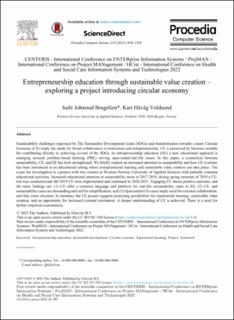| dc.contributor.author | Bragelien, Judit Johnstad | |
| dc.contributor.author | Voldsund, Kari Håvåg | |
| dc.date.accessioned | 2023-04-12T10:31:56Z | |
| dc.date.available | 2023-04-12T10:31:56Z | |
| dc.date.created | 2023-03-27T10:02:56Z | |
| dc.date.issued | 2023 | |
| dc.identifier.citation | Procedia Computer Science. 2023, 219, 1920-1929. | en_US |
| dc.identifier.issn | 1877-0509 | |
| dc.identifier.uri | https://hdl.handle.net/11250/3062594 | |
| dc.description.abstract | Sustainability challenges expressed by The Sustainable Development Goals (SDGs) and transformation towards a more Circular Economy (CE) imply the needs for broad collaboration in innovation and entrepreneurship. CE is perceived by business suitable for contributing directly to achieving several of the SDGs. In entrepreneurship education (EE) a new educational approach is emerging towards problem-based learning (PBL) solving open-ended real-life issues. In this paper, a connection between sustainability, CE, and EE has been strengthened. We briefly explore an increased attention to sustainability and how CE overtime has been introduced in an educational setting where entrepreneurial learning and sustainable value creation can take place. The scope for investigation is a project with two courses at Western Norway University of Applied Sciences with partially common educational activities. Increased educational attention to sustainability arose in 2017-2018, during spring semester of 2019 a CE-test was conducted and fall 2019 CE were implemented and continued in 2020-2021. Engaging CE shows positive outcome, and the main findings are: (1) CE offer a common language and platform for real-life sustainability cases in EE; (2) CE- and sustainability-cases are demanding and call for simplification; and (3) Open-ended CE-cases imply need for external collaboration, and thus more structure. In summary the CE project suggests promising possibilities for experiential learning, sustainable value creation, and an opportunity for increased external orientation. A deeper understanding of CE is achieved. There is a need for further empirical examination. | en_US |
| dc.language.iso | eng | en_US |
| dc.publisher | Elsevier | en_US |
| dc.rights | Attribution-NonCommercial-NoDerivatives 4.0 Internasjonal | * |
| dc.rights.uri | http://creativecommons.org/licenses/by-nc-nd/4.0/deed.no | * |
| dc.title | Entrepreneurship education through sustainable value creation – exploring a project introducing circular economy | en_US |
| dc.type | Peer reviewed | en_US |
| dc.type | Journal article | en_US |
| dc.description.version | publishedVersion | en_US |
| dc.rights.holder | © 2023 The Authors. | en_US |
| dc.source.pagenumber | 1920-1929 | en_US |
| dc.source.volume | 219 | en_US |
| dc.source.journal | Procedia Computer Science | en_US |
| dc.identifier.doi | 10.1016/j.procs.2023.01.491 | |
| dc.identifier.cristin | 2137063 | |
| cristin.ispublished | true | |
| cristin.fulltext | original | |
| cristin.qualitycode | 1 | |

